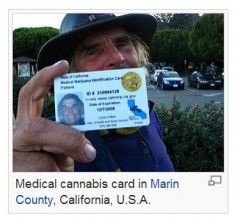New CA pot bill snuffed out
by James Poulos | August 21, 2014 9:50 am
 Despite the backing of California cops, the latest effort to craft statewide rules on medical marijuana has stalled in Sacramento.
Despite the backing of California cops, the latest effort to craft statewide rules on medical marijuana has stalled in Sacramento.
Widely criticized as an imperfect bill, SB1262[1] nonetheless mustered support as a good faith attempt to bring order to the chaos unfolding in the wake of the 1996 passage by voters of Proposition 215[2], which legalized medical marijuana in California. The bill was authored by state Sen. Lou Correa, D-Santa Ana.
The language of Prop. 215 included this passage, “To encourage the federal and state governments to implement a plan to provide for the safe and affordable distribution of marijuana to all patients in medical need of marijuana.”
But “encourage” was not strong enough a word, as little has been done in the past 18 years to implement Prop. 15 in a statewide fashion. Instead, across California’s many municipalities local laws have taken dramatically different approaches to medical pot.
SB1962 at least would have been a start at finally implementing the intent of Prop. 215 for statewide regulation. Instead, the bill was put on hold by the Assembly Appropriations Committee, dashing activists’ hopes until at least next year.
Tangled regulations
Supported by the League of California Cities as well as law enforcement groups, SB1262 would have approached the patchwork regulations that complicate pot law by creating a single state government agency, the Bureau of Medical Marijuana Regulation. As the Sacramento Bee detailed[3], the bureau would have been established as a branch of the Department of Consumer Affairs. By licensing and standardizing the cultivation, sale and transport of marijuana, proponents hoped the bill would ensure that both medical pot suppliers and police departments would enjoy an increase in predictability and control.
A flurry of amendments, many of which were interpreted as victories for activists, failed to help the bill’s fortunes. The laundry-list character of the adopted changes underscored the challenge of bringing a single set of standards and rules to California’s sprawling and complex marijuana economy.
Among the amendments were provisions[4] that would lift a proposed cap on licensed cultivators, allow applicants with former medical marijuana convictions to obtain licenses and allow applicants to be licensed in multiple categories, including cultivation and distribution.
In a little noticed but significant provision, SB1262 would also permit the nearly $2 billion medical marijuana industry to turn a profit. As the East Bay Express reported[5], current guidelines, crafted in 2008, required medical pot collectives to “operate as ‘not-for-profit’ enterprises.” The rule has become a legal sticking point in recent years as arrests, raids and prison sentences have depended on charges of “profit-making.”
Despite these potentially controversial details, SB1262 was seen as an improvement on previous legislation. State Assemblyman Tom Ammiano, D-San Francisco, saw his competing bill, AB 1894, fail in the Assembly this May.
Nevertheless, he became a co-author of SB1262, which incorporated key provisions of AB1894. California cops didn’t throw their weight behind Ammiano’s bill. According[6] to Vice News, cops’ cooperation on SB1262 led activists to suspect that law enforcement wanted SB1262 to shape marijuana reform before voters had a chance to consider a ballot initiative to legalize recreational pot use in 2016.
Political jockeying
Sure enough, politicians including Lt. Gov. Gavin Newsom have made public their willingness to campaign for a ballot initiative in two years’ time. Andrea Koskey, Newsom’s communications director, told[7] the Huffington Post that Newsom would support a ballot measure that addresses age limits, advertising and “driving under the influence.”
Further details, however, remained somewhat shrouded in calculated uncertainty. Newsom, said Koskey, “doesn’t want to see the drug in the hands of kids,” but listed a series of policy questions “that we don’t have answers to yet,” ranging from taxes and banking to restrictions on public use.
Newsom, who is expected to run for governor in 2018, has been vocal in his opposition to Gov. Jerry Brown on the issue of pot regulation. While Brown has warned that legalizing recreational marijuana would harm Californians’ ability to stay focused and alert, Newsom has countered that the war on drugs has complicated Brown’s struggles to bring California’s prison system into line with a string of harsh federal judicial rebukes. On MSNBC, Newsom said[8] the governor was simply “wrong” on the issue.
The disagreement among top-ranking Democrats indicates the failure of SB 1262 won’t be the last of Sacramento’s efforts to wrangle a marijuana bill that can pass. But the next piece of legislation won’t come from Ammiano or Correa. Both are term limited this year.
- SB1262: http://leginfo.legislature.ca.gov/faces/billNavClient.xhtml?bill_id=201320140SB1262
- Proposition 215: http://vote96.sos.ca.gov/bp/215text.htm
- detailed: http://www.sacbee.com/2014/08/14/6629382/cop-backed-california-medical.html
- provisions: http://blog.sfgate.com/smellthetruth/2014/08/05/cali-pot-rules-getting-patient-friendly-asa-says/
- reported: http://www.eastbayexpress.com/oakland/we-test-eaze-apps-promise-of-pot-in-ten-minutes/Content?oid=4042737
- According: https://news.vice.com/article/californias-move-towards-recreational-weed-goes-up-in-smoke-again
- told: http://www.huffingtonpost.com/2014/08/11/gavin-newsom-marijuana_n_5662347.html
- said: http://www.huffingtonpost.com/2014/03/18/gavin-newsom-marijuana_n_4987561.html
Source URL: https://calwatchdog.com/2014/08/21/new-ca-pot-bill-snuffed-out/